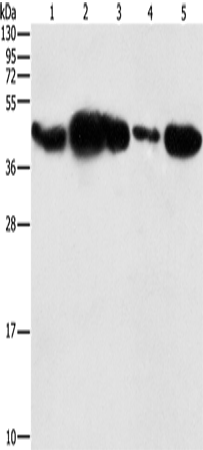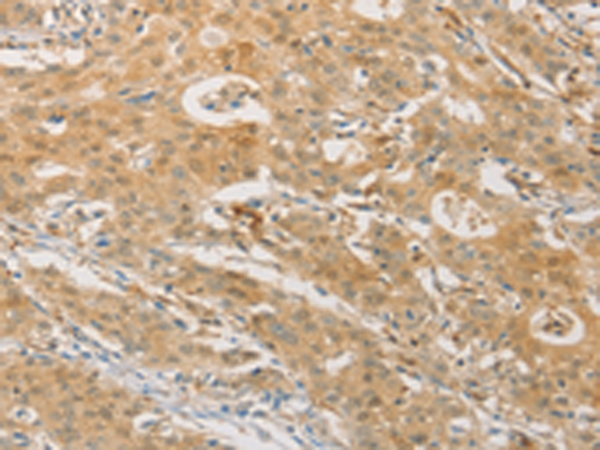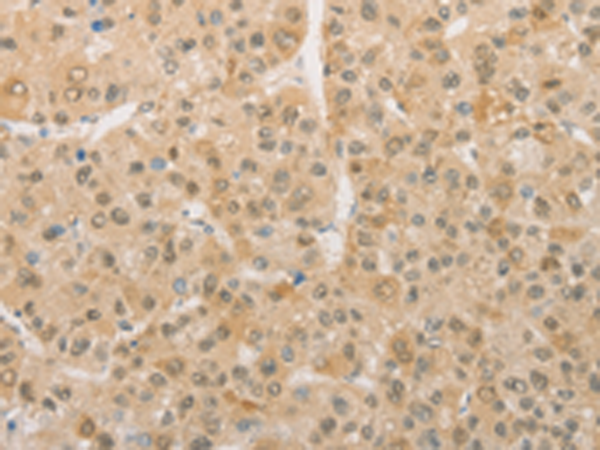


| WB | 咨询技术 | Human,Mouse,Rat |
| IF | 咨询技术 | Human,Mouse,Rat |
| IHC | 1/40-1/200 | Human,Mouse,Rat |
| ICC | 技术咨询 | Human,Mouse,Rat |
| FCM | 咨询技术 | Human,Mouse,Rat |
| Elisa | 1/5000-1/10000 | Human,Mouse,Rat |
| Aliases | PGKB; PGKPS; dJ417L20.2 |
| WB Predicted band size | 45 kDa |
| Host/Isotype | Rabbit IgG |
| Antibody Type | Primary antibody |
| Storage | Store at 4°C short term. Aliquot and store at -20°C long term. Avoid freeze/thaw cycles. |
| Species Reactivity | Human, Mouse, Rat |
| Immunogen | Fusion protein of human PGK2 |
| Formulation | Purified antibody in PBS with 0.05% sodium azide and 50% glycerol. |
+ +
以下是关于CLEC10A抗体的3篇参考文献及其摘要概括:
---
1. **文献名称**: *The C-type lectin receptor CLEC10A is a key factor for the recognition of glycans from pathogens and tumor antigens by human dendritic cells*
**作者**: Burgdorf, S., et al.
**摘要**: 该研究揭示了CLEC10A(CD301)在树突状细胞中对病原体和肿瘤相关糖抗原(如半乳糖-N-乙酰半乳糖胺)的识别作用。通过抗体阻断实验,证明CLEC10A介导了抗原摄取并促进T细胞免疫应答,提示其在抗肿瘤免疫治疗中的潜在应用。
2. **文献名称**: *CLEC10A is a specific marker for human M2 macrophages and modulates fungal recognition via interaction with Candida albicans*
**作者**: Meyer-Wentrup, F., et al.
**摘要**: 研究发现CLEC10A可作为M2型巨噬细胞的标志物,并通过抗体实验证实其与白色念珠菌表面多糖的结合能力。抗体阻断CLEC10A后,巨噬细胞的抗真菌活性降低,表明其在先天免疫中的关键作用。
3. **文献名称**: *CLEC10A is a prognostic biomarker and correlates with tumor-infiltrating immune cells in hepatocellular carcinoma*
**作者**: Sanyal, A., et al.
**摘要**: 该文献利用CLEC10A抗体分析肝细胞癌组织中CLEC10A表达水平,发现其高表达与M2巨噬细胞浸润及患者预后不良相关,提示CLEC10A可能作为肿瘤微环境的免疫调节靶点。
---
以上研究均通过CLEC10A抗体探讨了其在免疫识别、病原体防御及肿瘤微环境中的功能,为相关治疗策略提供了理论依据。
CLEC10A (C-type lectin domain family 10 member A), also known as CD301 or macrophage galactose-type lectin (MGL), is a transmembrane C-type lectin receptor primarily expressed on myeloid cells, including dendritic cells and macrophages. It recognizes terminal galactose/N-acetylgalactosamine (Gal/GalNAc) residues on glycoproteins and glycolipids, playing a role in pathogen recognition, immune tolerance, and homeostasis. CLEC10A binds endogenous ligands such as tumor-associated carbohydrate antigens (e.g., Tn and sialyl-Tn) and microbial ligands from pathogens like *Schistosoma mansoni* or *Helicobacter pylori*.
Functionally, CLEC10A is implicated in modulating immune responses. It promotes anti-inflammatory cytokine production, T-cell tolerance, and regulatory T-cell induction, while suppressing pro-inflammatory pathways. In cancer, CLEC10A+ macrophages are often associated with immunosuppressive tumor microenvironments, though their role varies by context. Studies highlight its dual role: promoting tumor progression in some cancers (e.g., colorectal) while enhancing antitumor immunity in others.
CLEC10A antibodies are critical tools for studying myeloid cell subsets, glycan-mediated interactions, and disease mechanisms. They are used in flow cytometry, immunohistochemistry, and functional assays to explore CLEC10A's involvement in cancer, infectious diseases, and autoimmune disorders. Clone-specific antibodies (e.g., H0374. 19E1) help dissect ligand-binding specificity and signaling pathways, offering potential for diagnostic or therapeutic targeting.
×